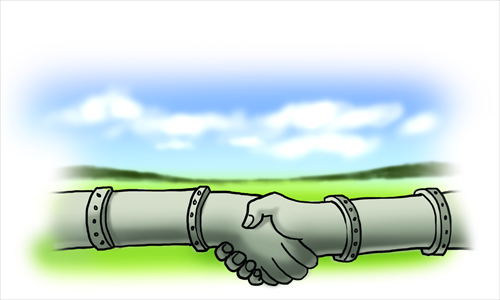Ukraine may top agenda in Putin visit

Illustration: Liu Rui/GT
Russian President Vladimir Putin kicks off his two-day visit to China on Tuesday. This visit should be looked at in the context of the Ukrainian crisis, Crimea's joining Russia and drastic changes in the Western policy toward Russia.
The decision of the Russian leadership to accept Crimea came as a shock to the Western community. Nobody expected Russia to dare to defend its national interests in the most resolute manner.
There are at least three international implications of Crimea's joining Russia.
First, it is a sign that the epoch of the Russian "retreat" of the 1990s and early 2000s is over and Russia is capable of pursuing its own policy even if it contradicts the Western one.
Second, by imposing sanctions on Russia the EU and the US gave Russia a push to rebalance its strategy toward the Asia-Pacific region. The attempt to isolate Russia in the West will increase Russian cooperation with friendly Asian countries and speed up the search for new partners in the Asia-Pacific region.
Third, geopolitical and economic cooperation between Russia and China will be even more valuable.
Will the situation in Ukraine be on the agenda of talks during Putin's China tour? It is possible that the situation in Ukraine will not be at the top of the agenda, but it will have a certain influence on the topics being discussed.
The recent visit of US President Barack Obama to four Asian countries, especially the signing of the security pact with the Philippines, confirmed the continuity of the US rebalancing toward the Asia-Pacific region and the US stance on containing the clout of a rising China in the region. Some US allies have misgivings that the precedent in Crimea may encourage China to pursue a more assertive policy in the South China Sea and the East China Sea.
In May during his visit to Brussels Japanese Prime Minister Shinzo Abe signed a partnership agreement with NATO. According to Reuters, Abe drew a parallel between the situation in Ukraine, where Russia has accepted Crimea, and Asia, in an apparent allusion to a standoff between Beijing and Tokyo over tiny uninhabited islands in the East China Sea.
Japan joined the EU and the US in imposing sanctions on Russia, thus damaging Russian-Japanese relations. But this unfriendly move will make relationship between Russia and China stronger.
The US and its allies' activities as well as the isolation of Russia will give a new impetus to beef up cooperation between Russia and China.
In spring 2013 the Crimean-based shipbuilding plant in Feodosiya finished the construction of the amphibious assault ship Zubr which costs $350 million. Another ship is being built today. At present, Crimean cooperation with China has become Russian. It is highly likely that further geopolitical and military cooperation will be on the agenda of the talks between Russian and Chinese leaders.
At the same time probably the dominating item of the talks will be an economic one. Both sides are supposed to sign a new natural gas deal which has been being negotiated for about 10 years.
Russia faces growing pressure from the EU on the terms of gas supply to Europe as well as continuing sanctions, while China are interested in concluding this deal to develop Chinese industry. One of the burning economic issues now is to construct a transport corridor bypassing Ukraine. It can be built through the Gulf of Kerch to connect the Russian mainland and the Crimean Peninsula. Russia hopes and welcomes Chinese participation in this project.
Russia also plans to open an economic zone in Crimea to create comfortable conditions for business and investments. Chinese experience in creating such a zone in the port of Dalian may be useful for Russia.
All these moves have both economic and political characteristics. They should show that Russian-Chinese relations are solid, long-term and do not depend on political conjunctures.
The author is chair of the Political Science Department at the Diplomatic Academy in Moscow. opinion@globaltimes.com.cn